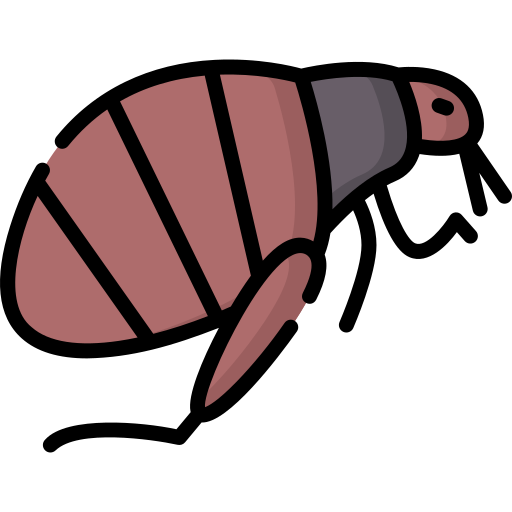Fleas
Fleas are small parasitic insects that feed on the blood of animals and humans. They are tiny, measuring 1 to 3 millimeters long, and can spread quickly among pets and in the home.
Flea bites can cause irritation and discomfort to people and their pets. Symptoms include intense itching, small red spots on the skin where the fleas bit, and even inflammation. Prolonged exposure to flea bites can lead to allergies and other skin conditions.
Fleas go through several stages in their life cycle. The egg, larva, and pupa stages occur in the environment, usually in or near where their hosts live. Once they emerge as adults, female fleas seek out hosts to feed on their blood and lay their eggs.
To control flea infestation, it is important to treat both pets with an anti-flea product and the environment with insecticides to eliminate eggs and larvae. Deep cleaning of the home and bedding is essential.
eliminate fleas - fumigate fleas - flea treatment
Types of Fleas in Spain:
Complete Guide for Identification and Control
Fleas are small parasitic insects that feed on the blood of animals, including humans. These pests can cause discomfort, intense itching, and transmit diseases to their hosts. In this article, we will explore the different types of fleas found in Spain, as well as methods to eliminate and prevent them.
If you have a flea problem at home, in the garden or in the field, contact a specialist.
At Higienisa we are experts in treatments and services to eliminate fleas.
Effective methods to eliminate fleas from home
Eliminating fleas from the home is essential to maintaining a healthy environment free of infestations. Here are some effective methods:
1. Thorough cleaning: Vacuum and wash all surfaces, carpets, bedding and furniture where fleas can hide. Be sure to dispose of the vacuum bag immediately.
2. Chemical treatment: Use specific insecticides for fleas in infested areas. Follow product instructions and take precautions to protect pets and people during the process.
3. Heat Treatment: Wash pet bedding and clothing at high temperatures to kill fleas and their eggs. You can also use heat dryers on clothes that cannot be washed.
4. Pet Control: Treat your pets with appropriate flea products and consult a veterinarian for additional recommendations.
Do you have a flea problem?
Contact us. We are experts in eliminating fleas.
More than 40 years of experience support us.
OR GIVE US A CALL
965 952 750
Types of fleas in Spain

Flea del Gato (Ctenocephalides Felis)
The cat flea is the most common species of domestic flea in Spain. It feeds on the blood of cats, dogs and other pets. These fleas are agile jumpers and can cause intense itching and allergic reactions in their hosts.

Dog Flea (Ctenocephalides Canis)
The dog flea is similar to the cat flea and is also common in Spain. It is found in dogs, cats and other animals. It can cause itching and transmit diseases if not properly controlled.

Human Flea (Flea Irritant)
The human flea can affect people and occasionally domestic animals. Although it prefers human hosts, it can also infest pets. These fleas can transmit diseases and cause itching and skin irritation.
Professional flea control treatments
If the flea infestation is severe or persistent, it is advisable to seek the help of pest control professionals. Some professional treatments include:
Consejos, remedios y preguntas frecuentes sobre las pulgas
Tips to prevent flea infestations
To prevent flea infestations, it is recommended to follow these tips:
1. Maintain good hygiene: Regularly vacuum and wash pet bedding. It is also important to bathe and brush your pets regularly.
2. Pet control: Use appropriate anti-flea products for your pets, such as collars, shampoos and pipettes, following the veterinarian's recommendations.
Home remedies to control fleas
Although professional treatments are more effective, some home remedies can provide temporary relief. Some popular home remedies include:
1. Apple cider vinegar bath: Mix water and apple cider vinegar in equal parts and apply the solution to your pet's fur. This can help temporarily repel fleas.
2. Use of repellent plants: Some plants, such as catnip, mint or lavender, may have natural repellent properties against fleas.
Frequently asked questions about fleas
Remember that if you have more questions or need additional assistance, you can always contact pest control professionals specialized in fleas, such as Higienisa. We will be happy to provide personalized advice and specialist services in flea treatment and removal.
If you have a flea problem at home, in the garden or in the field, contact specialists.
At Higienisa we are experts in treatments and services to eliminate fleas.
Our treatments to eliminate fleas
Eliminar pulgas en jardín o parcela
Treatment to eliminate fleas in public or private plots.




